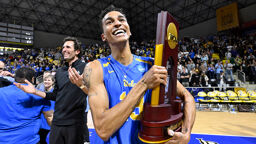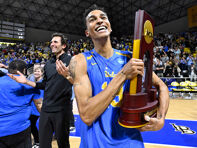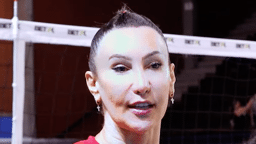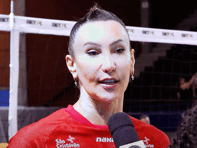It has been 10 years since the NCAA first implemented its transgender student-athlete policy. Taylor Edelmann was a volleyball player at Purchase College in New York in 2011, and the new policy was a critical part of the change they needed.
“I so badly wanted the opportunity to play,” Edelmann recalled. “Just being affirmed and being able to play on the men’s team meant more to me than winning a championship.”
Edelmann, who was building their name as a standout on the Panthers’ women’s volleyball team in their first two years at the school, transitioned and then became a standout on the men’s team as well. Their journey as a person and an athlete was the subject of a far-reaching interview on this week’s Edition of the Trans Sporter Room, and a follow up on a story Outsports brought to you in 2013.
Today as a 30-year-old husband, father of four, and a health equity coordinator with a community health organization in Connecticut, Edelmann looked back on the unknowns at the beginning.
“It was definitely uncharted territory,” he recalled. “They said they never had a transgender athlete come forward and say they wanted to play on the team opposite of the gender they were assigned at birth, but they were willing to figure it out. It was imperfect, but it got me to where I needed to be.”

Getting to where Edelmann felt he needed to be was a climb that clashed with his ascent as an accomplished volleyball player. Growing up in Bethel, Connecticut, he was an all-around athlete, and they were a star for a Bethel High School girls volleyball team that was one of the most competitive in their class in their state between 2005-08.
Edelmann was a three-time all-conference selection. He was all-state in his senior year. He was a centerpiece of four straight state tourney qualifying teams, yet through all the accolades on the court, he struggled off of it. How can one enjoy the success when people see you as something you aren’t?
“I hated the wearing the spandex. I hated having long hair because my mom wouldn’t let me cut my hair,” he recalled stoically. “I had all these constant reminders that I wasn’t presenting the way that I wanted to, but my love for the sports overrode it.”
He also talked about stares and questions his parents would get in the stands whenever he played in high school. The constant clamor of “Is that a boy or a girl?” At the same time, his play was gaining notice. Even in 2008, being seen as gender non-conforming was met with more side-eyes than acceptance, and Edelmann keenly felt it.
“I was just so used to being my own person and I was an enigma. I was always consistently me,” he said. “I had to put myself and my feelings aside and keep my identity down below. I always knew I would come out eventually. I was just waited for the time.”
That time was during winter break in his freshman year at Purchase. Edelmann was coming off a solid first year in the college game among the team leaders in kills and digs, yet a lifetime of dysphoria and frustration bubbled over.
“One of my brothers and I were playing a video game online and you know how nasty people are online and their trash-talking,” he said. “I mentioned something and somebody said something about my being a lesbian or being a dyke or whatever and I just was at a point where I just had it.”
“I went off on this kid and my brother told my mom what went down,” he continued. “She came to my room and she was asking that if there was something I wanted to tell them and I just started crying. I kept saying ‘you have no idea what I’ve been dealing with for my entire life.’”
That same day Edelmann came out as transgender to his entire family. That day was also the catalyst for the decision they’d make after a successful sophomore season on the women’s team at Purchase in 2010. He said he was leaving the sport to pursue his truth and play men’s volleyball in time for the Panthers’ winter-spring 2012 schedule.
“I spoke with my teammates and they were all overwhelmingly supportive and they said ‘You’re the best’ and ‘You’ll be great’,” Edelmann noted. “Thankfully I had the same coach on the men’s team as on the women’s team so it was easy to have that conversation.”
Over the next year, Edelmann prepared as a person and as an athlete as the school worked through the NCAA guidelines, and in 2012, Taylor Edelmann lined up as an outside hitter for the Purchase College Panthers men's volleyball team. Even as an already accomplished player, the learning curve was steep learning a different style of play on a struggling team and he ran into both harsh realities early on.

“I was in my outside hitter position and their middle hitter just smacked it on an angle so hard at my face,” Edelmann remembered. “The awesome thing was I was able to keep the ball in play. It bounced off my forehead and we ended up playing point.”
“That’s when I realized this is serious business,” he continued. “But I hung on. I was still an outside hitter at 5’7” where the average player on the court as at least 6 feet tall.”
Despite a difficult 2-19 record that year, Edelmann led the team in digs and had 45 kills. His effort, spark and leadership so impressed his teammates that they named him as the team’s captain in 2013. These experiences as an athlete and team leader propelled Edelmann in finding his own way as a person.
“Really having support coming from multiple facets was crucial for me in being encouraged my authentic self,” Edelmann noted. “I don’t think that I’d be where I am today without that.”
Taylor Edelmann had a lot to say about their journey, but also about the current state of the debate over trans inclusion in sport, the NCAA’s policy 10 years later, married life, parenthood, and his love of “Mystery Science Theater 3000.”
Check out the complete interview in this week’s edition of The Trans Sporter Room. Check it out on Megaphone, Spotify, Google Podcasts, Apple podcasts, and many other platforms for Outsports podcasts as well.
.







































